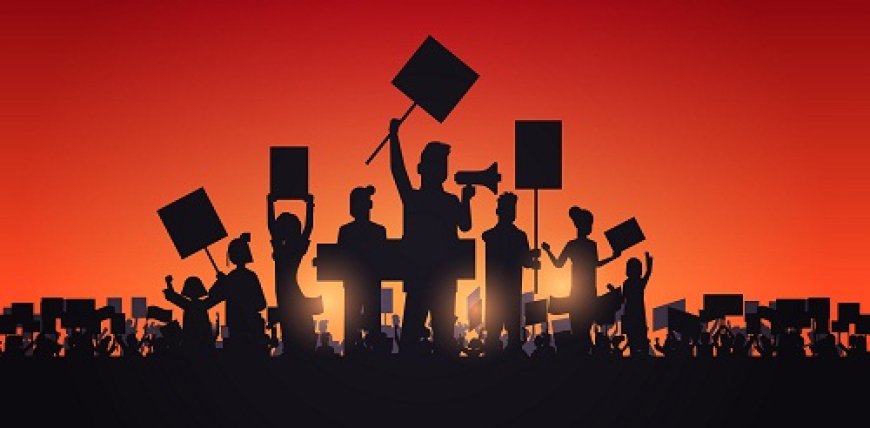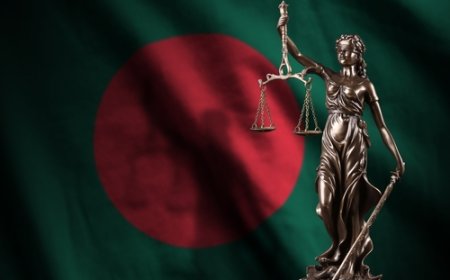Post-July Bangladesh: Between the Fall of Fascism and the Struggle for Genuine Reform
The AL may be gone (for now) but that doesn't mean that fascism has been eradicated from the body politic

Rabindranath famously once said: "It is a sin to lose faith in mankind." But what can we do when a situation like this is created -- at a time when hardly do we have any options except to condemn them and to avoid those who did not stay committed to the aspirations of July?
Moreover, it is the high time to search for what the outcome of the July moments has been. Another point is that we have seen the fascist government is gone. After the election, a new one took its place -- someone who told us he or she would not be like a fascist. However, now it is proven that he has gained personal profit just like the fascists, as well as built up a narrative with others.
Plato, in his famous work The Republic, narrated in detail how to establish a model state that ensures equity, justice, harmony, and the overall well-being of all its citizens. This ideal state, according to him, should be governed by enlightened men who are wise and just leaders.
In line with this, on September 4, The Daily Star published an insightful article titled: "Can the Student Movement Free Us From Dynastic Politics?"
This article suggested ways to build a new political party that completely avoids personality cults and ensures true equality. Instead, it emphasized adopting a capability approach and placing the rule of education at the center of political leadership.
After the events of July and the subsequent fall of fascism, an interim government was formed to address the urgent needs of the state’s stakeholders. Diplomatically, this process is referred to as the formation of a government during a transitional period.
However, in many areas, the existing system underwent automatic changes, where most general citizens became involved with various non-governmental groups, political parties, student organizations, business associations, bank committees, university and college committees, as well as bus committees.
Although power transformation took place throughout the country, the fundamental institutional legal framework remained unchanged.
“We broke the fear, but we haven’t broken the system yet. That fight is far from over,” says Umama Fatema.
Therefore, it is the responsibility of the interim government to address this gap and ensure proper reforms. Furthermore, one must ask: what tangible benefits has July brought, and who are its real beneficiaries? Is it truly the general populace who have gained from these changes?
The gist of power transformation means that those who did not have power or positions before automatically gained power after July. Most of them are now involved in extortion, which includes not only political parties but also student leaders.
It is very shameful that some student leaders who once led the July movement have now shown qualities similar to fascism. This, indeed, is the harsh reality because Bangladesh’s politics lacks idealistic leadership and vision. As a result, politics here is mostly about gaining power, money, and profit rather than serving the people.
On the other hand, some who lead movements may have initial encouragement but lack true leadership qualities. They might succeed once, but eventually fail because they lack the essential morality and principles of political philosophy needed to sustain leadership.
Political parties do not yet have the intention to change the culture of politics, nor do they have anyone to teach politicians the morality of political culture. What we hear now are slogans like: "X-er chamra tule nebo amra" (we will skin them alive), "X-er Banglay, Y-er thai nai" (in X’s Bangladesh, there is no place for Y), and "Ei muhurte Bangla chhar" (leave Bangladesh right now).
Plato, in The Republic, explained that those who are truly capable and spiritually attuned to politics should lead political parties. But today, we see a different trend -- popularity matters more. In the July movement, those who stood on the frontlines and showed genuine commitment but lacked media visibility or trending presence have now been sidelined.
Instead, the spotlight shines on those with media influence. Recently, Umama Fatema raised a critical question: “Why should the July movement become a money machine? Unfortunately, it has become one.”
We don’t know how much of this is true, but this concern demands attention. Hence, I urge all leaders of the July movement -- from college to university, from top to bottom -- to openly respond to Umama’s question and prove through their thoughts and actions that: “I was right -- and here is my certificate of rightness.” Only by doing so can they demonstrate true leadership and restore faith in the movement’s original goals and values.
In reality, the fall of fascism does not automatically bring democracy, which requires unity between political parties. This unity has already been absent, especially in Bangladesh after July.
Instead, we have seen an anomalous situation throughout the country, from top to bottom. They need to come together and work collectively to build a new Bangladesh that can become a symbol of the post-July era, but this has not yet been possible because, systemically, some have benefited while others have become beneficiaries.
Moreover, a positive sign of July is that many people were freed from prison and a new life began after the fascist government. People started speaking openly and freely. College and university movements occurred without fear or hesitation. In short, oppressed people were freed from fascist rule.
However, there has been no change yet for those living on the margins -- daily laborers, garment workers, rickshaw drivers, and others -- who remain in poverty. Institutional reforms have not taken place, and those rebuilding the system belong to factions of favoritism.
Religious extremism and attacks on shrines -- since August 5, 2024, there has been a series of attacks on various shrines and dargahs across Bangladesh, posing a serious threat to religious tolerance. According to police reports, a total of 44 attacks have occurred during this period, targeting 40 different shrines. These attacks involved not only vandalism and looting but also cases where shrines were set on fire and devotees were directly assaulted.
The highest number of incidents -- 17 -- took place in Dhaka, followed by 10 in Chittagong and 7 in Mymensingh. Police reported that 15 regular cases and 29 general diaries (GDs) have been filed in response. So far, 23 individuals have been arrested. Although no specific group has been officially named as responsible, religious extremism and local political conflicts are suspected as the main causes.
Additionally, looting under the guise of reform, lobbying and lawsuit trade, extortion by coordinators, and a worsening economic situation have all contributed to making the situation increasingly complex. Furthermore, if the government changes, a certain religious group fears the threat of arrest.
What's Your Reaction?











































































